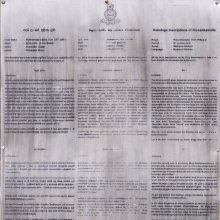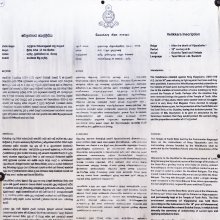Barata, Barāta, Baraṭa: 9 definitions
Introduction:
Barata means something in Hinduism, Sanskrit, the history of ancient India, Marathi, Hindi, biology. If you want to know the exact meaning, history, etymology or English translation of this term then check out the descriptions on this page. Add your comment or reference to a book if you want to contribute to this summary article.
Alternative spellings of this word include Barat.
Images (photo gallery)
India history and geography
Source: Cologne Digital Sanskrit Dictionaries: Indian Epigraphical GlossaryBaraṭa.—(CII 4), a plant grown for fencing. Note: baraṭa is defined in the “Indian epigraphical glossary” as it can be found on ancient inscriptions commonly written in Sanskrit, Prakrit or Dravidian languages.

The history of India traces the identification of countries, villages, towns and other regions of India, as well as mythology, zoology, royal dynasties, rulers, tribes, local festivities and traditions and regional languages. Ancient India enjoyed religious freedom and encourages the path of Dharma, a concept common to Buddhism, Hinduism, and Jainism.
Biology (plants and animals)
Source: Google Books: CRC World Dictionary (Regional names)1) Barata in India is the name of a plant defined with Saccharum spontaneum in various botanical sources. This page contains potential references in Ayurveda, modern medicine, and other folk traditions or local practices It has the synonym Tricholaena semidecumbens (Roxb.) Schult. (among others).
2) Barata in Nigeria is also identified with Eragrostis ciliaris It has the synonym Poa boryana Willd. (etc.).
3) Barata is also identified with Eragrostis tremula It has the synonym Poa multiflora Roxb., nom. illeg., non Poa multiflora Forssk. (etc.).
Example references for further research on medicinal uses or toxicity (see latin names for full list):
· Mémoires de l’Académie Impériale des Sciences de St.-Pétersbourg. Sixième Série. Sciences Mathématiques, Physiques et Naturelles (1830)
· Report. Botanical Exchange Club. London. (1916)
· Monographiae Phanerogamarum (1889)
· Current Science (1989)
· Cytologia (1990)
· Enum. Hort. Berol. (1809)
If you are looking for specific details regarding Barata, for example pregnancy safety, chemical composition, health benefits, extract dosage, diet and recipes, side effects, have a look at these references.

This sections includes definitions from the five kingdoms of living things: Animals, Plants, Fungi, Protists and Monera. It will include both the official binomial nomenclature (scientific names usually in Latin) as well as regional spellings and variants.
Languages of India and abroad
Marathi-English dictionary
Source: DDSA: The Molesworth Marathi and English Dictionarybarāta (बरात).—m ( P) A suit at cards. 2 f An assignment or order upon the revenue. 3 (Commonly varāta) The company composing the homeward-procession of a wedded pair.
Source: DDSA: The Aryabhusan school dictionary, Marathi-Englishbarāta (बरात).—m A suit at cards. f An assign- ment or order upon the revenue. The company composing the home-ward procession of a wedded pair.
Marathi is an Indo-European language having over 70 million native speakers people in (predominantly) Maharashtra India. Marathi, like many other Indo-Aryan languages, evolved from early forms of Prakrit, which itself is a subset of Sanskrit, one of the most ancient languages of the world.
Sanskrit dictionary
Source: DDSA: The practical Sanskrit-English dictionaryBaraṭa (बरट).—A kind of grain.
Derivable forms: baraṭaḥ (बरटः).
Source: Cologne Digital Sanskrit Dictionaries: Monier-Williams Sanskrit-English DictionaryBaraṭa (बरट):—m. a species of grain, [Gṛhyāsaṃgraha] (cf. barbaṭa).
[Sanskrit to German]
Sanskrit, also spelled संस्कृतम् (saṃskṛtam), is an ancient language of India commonly seen as the grandmother of the Indo-European language family (even English!). Closely allied with Prakrit and Pali, Sanskrit is more exhaustive in both grammar and terms and has the most extensive collection of literature in the world, greatly surpassing its sister-languages Greek and Latin.
Hindi dictionary
Source: DDSA: A practical Hindi-English dictionary1) Barata (बरत) [Also spelled barat]:—(nm) a very stout rope; see [vrata].
2) Barāta (बरात) [Also spelled barat]:—(nf) a marriage party; —[karanā] to join the bridegroom’s party as a member.
3) Bārāta (बारात):—(nf) a wedding party; [tī] member of a wedding party; ~[ta karanā] to join a wedding party.
...
Kannada-English dictionary
Source: Alar: Kannada-English corpusBarata (ಬರತ):—
1) [adjective] full; complete.
2) [adjective] in greater quantity, amount, measure, degree or number.
3) [adjective] entire; whole.
4) [adjective] strong; robust.
--- OR ---
Barata (ಬರತ):—
1) [noun] (rightly, ಭರತ [bharata]) the periodic rise of the waters of the ocean, produced by the attraction of the moon and sun.
2) [noun] the quality or state of being greater in measure, degree, number, etc.
3) [noun] force or speed of movement; impetus; momentum; tempo.
4) [noun] a filling in of vacant place, position, space, etc.
--- OR ---
Barata (ಬರತ):—[noun] a kind of dish made of crushed, roasted brinjals and mixed with curds.
--- OR ---
Barāta (ಬರಾತ):—[noun] a broad, circular plate having a slightly raised rim around.
--- OR ---
Barāta (ಬರಾತ):—
1) [noun] a demand or request made forcefully or authoritatively.
2) [noun] a persistent demand for payment of money, esp. for payment of interest or repayment of loan.
Kannada is a Dravidian language (as opposed to the Indo-European language family) mainly spoken in the southwestern region of India.
See also (Relevant definitions)
Starts with: Baratana, Barataraph, Baratarapha, Barataraphi, Barataraphu, Baratarapu, Baratarphu, Baratarpu, Baratava.
Ends with: Audumbarata, Barbarata, Ibarata, Ilubarata, Nibarata, Obarata, Saratabarata.
Full-text: Barbata, Byaha, Barat, Cangakancani, Bharata.
Relevant text
Search found 1 books and stories containing Barata, Baraa, Barāta, Baraṭa, Bārāta; (plurals include: Baratas, Baraas, Barātas, Baraṭas, Bārātas). You can also click to the full overview containing English textual excerpts. Below are direct links for the most relevant articles:
Reviews < [October – December, 1982]


